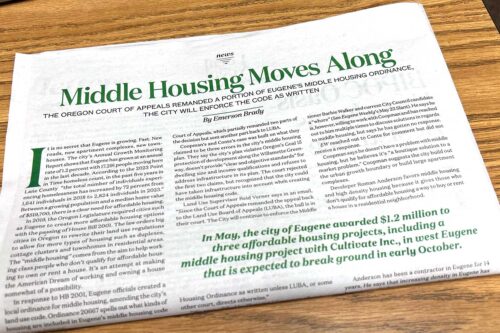
It is no secret that Eugene is growing. Fast. New roads, new apartment complexes, new townhouses. The city’s Annual Growth Monitoring Report shows that Eugene has grown at an annual rate of 1.2 percent with 17,291 people moving here in the last decade. According to the 2023 Point in Time homeless count, in the past five years in Lane County “the total number of individuals experiencing homelessness has increased by 72 percent from 1,641 individuals in 2018 to 2,824 individuals in 2023.” Between a growing population and a median home value of $519,700, there is a clear need for affordable housing.
In 2019, the Oregon Legislature required cities such as Eugene to create more affordable housing options with the passing of House Bill 2001. The law orders big cities in Oregon to rewrite their land use regulations to allow for more types of housing such as duplexes, cottage clusters and townhomes in residential areas. The “middle housing” comes from the aim to help working class people who don’t qualify for affordable housing to own or rent a house. It’s an attempt at making the American Dream of working and owning a house somewhat of a possibility.
In response to HB 2001, Eugene officials created a local ordinance for middle housing, amending the city’s land use code. Ordinance 20667 spells out what kinds of housing are included in Eugene’s middle housing code and its regulations.
Chair of the city’s Planning Commission, Dan Isaacson, called middle housing, ”One tool in the toolbelt in helping solve the housing crisis we have here in Eugene.”
Jefferson Westside Neighborhood board member Ted Coopman isn’t so sure that the city’s plans for middle housing are sound. Coopman argues that the city was “disrespectful” to dissenting opinions and didn’t take public critique into account when creating the ordinance. Coopman and frequent city critic Paul Conte took their issues with the middle housing ordinance to the Oregon Land Use Board of Appeals, which ruled with the city, and then to the Oregon Court of Appeals, which partially remanded two parts of the decision but sent another part back to LUBA.
Coopman’s and Conte’s case was built on what they claimed to be three errors in the city’s middle housing plan. They say the city’s plan violates Oregon’s Goal 15 protection of development along the Willamette Greenway, doesn’t provide “clear and objective standards” for dwelling size and income qualifications and refuses to address infrastructure in its plan. The court rejected the first two claims, but recognized that the city could have taken infrastructure into account when creating the middle housing code.
Land Use Supervisor Reid Verner says in an email, “Since the Court of Appeals remanded the appeal back to the Land Use Board of Appeals (LUBA), the ball is in their court. The City will continue to enforce the Middle Housing Ordinance as written unless LUBA, or some other court, directs otherwise.”
“We were vilified by Planning,” Coopman alleges.
Isaacson disputes that, pointing out that he “made over a hundred phone calls while we were creating Eugene’s middle housing code.” The Eugene City Council also held a public hearing and two work sessions on the topic.
Isaacson read a statement before every meeting asking for mutual respect, listening and productivity between the public and the Planning Commission, and he asked Conte in front of court to describe a time the city was disrespectful. Conte couldn’t name an instance.
He has described Conte as a “bully,” pointing to an instance where Conte called current City Council candidate Barbie Walker a “whore” (See Eugene Weekly’s May 23 Slant). He says he is, however, willing to work with Coopman and has reached out to him multiple times to discuss solutions in regards to middle housing, but says he has gotten no response.
EW reached out to Conte for comment but did not receive a response.
Coopman says he doesn’t have a problem with middle housing, but he believes it’s “a boutique solution to a market problem.” Coopman suggests the city build out the urban growth boundary or build large apartment complexes.
Developer Roman Anderson favors middle housing and high density housing because it gives those who don’t qualify for affordable housing a way to buy or rent a house in a residential neighborhood.
Anderson has been a contractor in Eugene for 14 years. He says that increasing density in Eugene has been a priority for contractors and the city for a long time. After Eugene created a middle housing ordinance, he’s seen an increase in interest and awareness of high density housing. Anderson says he is a big supporter of middle housing because “higher density housing and more housing will make all housing more affordable.”
In May, the city of Eugene awarded $1.2 million to three affordable housing projects, including a middle housing project by Cultivate Inc., in west Eugene that is expected to break ground in early October. Cultivate has experience in building successful middle housing projects such as the C-Street Co-op in Springfield.
The story has been updated.